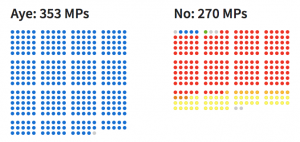The Trade Bill is returning to the House of Lords on 2nd February. Write to your MP now and ask them to support these amendments: https://agroecology.eaction.online/tradebill
In this blog, Catherine Chong from Farms To Feed Us talks through the Trade Bill vote last week, and discusses why these safeguards are needed and what we can learn from the parliamentary process.
On 19th January, MPs debated and voted on the Trade Bill amendments tabled by the Lords just the day before. These amendments are the crucial legal safeguards that the public has asked for and many civil societies have tirelessly campaigned for. The government missed the opportunity to include these safeguards in the Agriculture Bill, and the same issues have now been raised in the Trade Bill. These are the bare-minimum environmental and social safeguards for our agriculture and food systems, to avoid a further race-to-the-bottom in economic, environmental, social and governance terms, for many industries and societies here and globally.
These vital safeguards were voted down:
- Maintaining food safety, quality, hygiene and traceability, the environment, animal welfare, human rights and equalities, and, labour standards
- Parliamentary scrutiny of future trade agreements
- Revoking trade deal agreements with states accused of committing genocide (if the High Court of England and Wales makes a preliminary determination that the state which has committed genocide under Article II of the United Nations Convention on the Prevention and Punishment of the Crime of Genocide)
In addition, the Government, once again, maintained that the Trade & Agriculture commission (TAC), the body set up to advise the government on future international trade deals relating to agriculture, shall not advise on matters relating to human life or health. Along with many experts, we have been troubled with the lack of diversity in expertise and interest in the TAC and we are now even more concerned. Agriculture practices, food and human health are closely linked and to remove this from TAC’s remit will remove one of the most important aspects of food sovereignty and public scrutiny on future trade deals, including agriculture and food trade deals.
The government argued that these amendments “(…) represent serious constraints on the royal prerogative powers to negotiate, ratify and withdraw from treaties” and “would unduly tie the hands of Government to negotiate in the best interests of the UK”. The experience of the past few weeks suggests that the Constitutional Reform and Governance Act 2010 do not guarantee parliamentary scrutiny of trade deals. It’s not about trusting or not trusting if the government will always act in the best interests of the people in the UK, it’s about trusting a system will function better if it has more effective check and balances.
The Bill returns to the House of Lords on 2 Feb 21. While we continue to write to our MPs, It might be helpful to look at how the MPs have voted on three key Lord’s amendments, on the 19 Jan 21. It may help some of us to determine if writing to our MPs will make a difference?
Firstly, let’s look at the current composition of the House of Commons. There are 650 seats, but only 639 are effective voting seats, with 363 representing the Conservative party and 276 by opposition parties. The 11 non-voting seats comprise the four Speaker and Deputies, and the seven Sinn Féin MPs. That means, when voting on parliamentary legislation, the government has an effective working majority of 87 votes in the House of Commons, if all of the 639 MPs turn up for a debate and vote.

Source: State of the parties
Now, back to the House of Commons’ considerations of the Lord’s amendments last week. On the amendment intended to ensure that future trade agreement is consistent with UK levels of statutory protection regarding food safety, quality, hygiene and traceability, the environment, animal welfare, human rights and equalities, and, labour standards, 623 MPs voted on this amendment, of which 353 MPs (representing 56.7% of the House) voted against these safeguards. All 353 were Tory MPs. 270 MPs voted for these standards to be safeguarded, of which four were Tories MPs. 42 more votes (11.9% of the 353 MPs) were needed for the amendment to be accepted.

Source: Trade Bill: motion to disagree to Lords Amendment 6 – Division 205: held on 19 January 2021 at 18:58
On parliamentary scrutiny of future trade agreements, 629 MPs voted on this amendment, of which 352 MPs (representing 56.6% of the House) voted against these safeguards. All 352 were Tories MPs. 277 MPs voted for these standards to be safeguarded, of which 11 were Tory MPs. 40 more votes (11.3% of the 352 MPs) were needed for the amendment to be accepted.

Source: Trade Bill: motion to disagree to Lords Amendment 1 – Division 199: held on 19 January 2021 at 17:53
On revoking trade deal agreements with states accused of committing genocide if the High Court of England and Wales makes a preliminary determination that the state has committed genocide, 627 MPs voted on this amendment, of which much reduced number of MPs, 319 MPs (representing 50.8% of the House) voted against this amendment. All 319 were Tories MPs. 308 MPs voted for it, of which 34 were Tory MPs. This amendment needed only 6 more Tory MPs out of the 319 who voted against the amendment, to pass in the House of Commons on that day.

Source: Trade Bill: motion to disagree to Lords Amendment 3 – Division 202: held on 19 January 2021 at 18:27
So what could we draw from these examples?
At least two contrasting assumptions. If MPs continue to vote with their party, it may seem unlikely that these amendments will pass in the House of Commons, even if the Lords continue to pursue it. However, the last example illustrates how close the amendment was to being passed.
Perhaps a more important question is, how does it make you feel?
Do you feel more motivated now to write to your MP? Or feel motivated to be more engaged with the parliamentary process? Or do you think this is a done deal, let’s just rely on the civic societies and private sector to create mechanisms to help the public differentiate and distinguish the agricultural and food products that meet acceptable environmental and social standards?
It’s important to remind ourselves that unchecked importations of lower environmental and social standards will affect everyone: not just farmers, but everyone who eats, drink and breathe.
Every system needs check and balance. The lack of it is one of the main reasons for systemic injustices where the marginalised and the voiceless continue to be the most exposed, most sensitive, and most vulnerable to negative social and environmental impacts. We hope that you feel encouraged to join the public discussions and civic actions to continue to hold our parliamentarians accountable.

